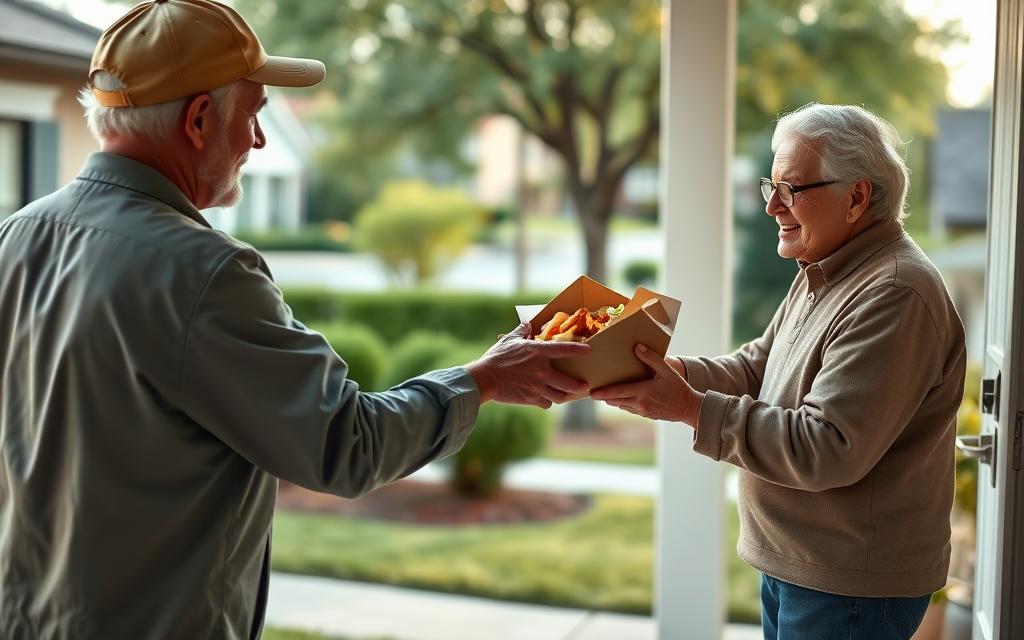Understanding Medicare Grocery Allowance Benefits
As you get older, you might ask: Can Medicare help with grocery expenses? The answer is yes, with the Medicare Grocery Allowance. It can really help with your money.
Many seniors struggle to eat well because they don’t have enough money. Original Medicare (Parts A and B) doesn’t cover food. But, some Medicare Advantage plans do offer a little help with groceries.
Want to know how to use the Medicare Grocery Allowance in 2025? This guide will show you. You’ll learn about the benefits, who can get it, and how to use it best. By the end, you’ll know how to save on groceries with Medicare’s help.
Key Takeaways
- Understanding the basics of Medicare Grocery Allowance and its benefits.
- Eligibility criteria for Medicare Advantage plans that offer grocery allowances.
- How to apply for and maximize your grocery allowance.
- The impact of Medicare Grocery Allowance on your overall healthcare and nutrition.
- Tips for choosing the right Medicare Advantage plan for your needs.
The Vital Role of Medicare Grocery Allowance in Senior Nutrition
Seniors can now get help from the Medicare Grocery Allowance. It helps them eat better to manage health issues. This is part of some Medicare Advantage plans.
This allowance is more than money. It’s a way to get healthier. It helps seniors buy food that’s good for them. This is key for managing diseases like diabetes and heart disease.
What This Life-Changing Benefit Means for You
The Medicare Grocery Allowance helps you buy healthy food. This is important for your health. It can lower your risk of getting sick from chronic conditions.
If you have diabetes, this benefit is very helpful. You can buy veggies, fruits, and whole grains. These foods are great for managing diabetes. They make you feel better and live better.
How Nutritional Support Transforms Senior Health
Nutrition is very important for seniors. It keeps them from getting too thin. It also helps manage diseases and can lower healthcare costs.
| Health Benefit | Description | Impact on Seniors |
|---|---|---|
| Malnutrition Prevention | Adequate nutrition prevents malnutrition | Reduces risk of health complications |
| Chronic Disease Management | Nutrition supports management of chronic diseases | Improves health outcomes and quality of life |
| Healthcare Cost Reduction | Proper nutrition reduces healthcare costs | Minimizes hospitalizations and healthcare expenses |
The Evolution of Medicare Food Benefits
Medicare has changed a lot over the years. Now, it includes benefits for seniors’ nutrition. The Medicare Grocery Allowance is a big step. It shows how important nutrition is for health.
This change shows a deeper understanding of health needs. It’s not just about treating sickness. It’s about keeping people healthy and well.
Exciting Updates to Medicare Grocery Allowance for 2025
As we get closer to 2025, Medicare Advantage plans are making big changes. They want to help seniors get the food they need. This will help them stay healthy.
Increased Benefit Amounts You Can’t Afford to Miss
One big change is more money for groceries. Many plans are giving more money to buy healthy food. This means seniors can eat better without spending too much.
Expanded Eligibility Criteria Opening Doors
More people will get help with groceries in 2025. This includes those with health issues or lower incomes. More seniors will get the help they need to eat well.
New Purchasing Options and Flexibility
2025 also means more ways to buy groceries. You can shop online or in stores. Some plans even offer digital payments for easier shopping.
These changes show Medicare’s dedication to helping seniors. With more money, wider eligibility, and new ways to shop, it’s easier to eat well and stay healthy.
Who Qualifies for These Essential Food Benefits?
It’s important to know who gets the Medicare Grocery Allowance. This is for seniors who need help with food. The rules change based on your Medicare plan.
Basic Eligibility Requirements Made Simple
To get it, you must be in a Medicare Advantage plan with this benefit. Most plans offer it, but check your plan.
You need to be a Medicare member, usually 65 or older, or have a disability. Also, keep your Medicare payments up to date.
Income Thresholds and Financial Considerations
How much money you make affects your eligibility. Some plans have income limits. It’s key to look at your plan’s rules.
Your yearly income and savings are checked. Plans have different rules. So, it’s good to compare plans.
Special Qualifying Circumstances You Should Know
Some situations can make you eligible for more benefits. For example, if you have chronic conditions or need more nutrition, you might get extra help.
Plans also help those in rural areas or with hard access to stores. Knowing these can help you get more benefits.
By looking at the rules and your situation, you can see if you qualify. This way, you can use this great benefit to its fullest.
Medicare Advantage Plans With Generous Grocery Benefits
There are many Medicare Advantage plans to choose from. It’s important to compare their grocery benefits. This helps you find the best plan for your needs.
Top-Rated Plans with the Best Food Allowances
Some Medicare Advantage plans offer more grocery benefits than others. UnitedHealthcare and Humana have plans with big food allowances. These help you eat well without spending too much.
Comparing Benefit Amounts Across Providers
When looking at Medicare Advantage plans, check the benefit amounts. The table below shows the grocery allowances of top providers:
| Provider | Basic Benefit Amount | Maximum Benefit Amount |
|---|---|---|
| UnitedHealthcare | $50/month | $120/month |
| Humana | $40/month | $100/month |
| Aetna | $45/month | $110/month |
Regional Variations That Affect Your Coverage
Where you live affects the grocery benefits of Medicare Advantage plans. Plans in cities might be different from those in the countryside. It’s very important to check the plans in your area to know what you can get.
By comparing these plans, you can choose one that meets your nutritional needs and health goals.
Step-by-Step Application Process That Won’t Overwhelm You
The Medicare Grocery Allowance application is easy to use. You can apply online or in person. Knowing the steps and resources helps a lot.
Documentation You’ll Need to Gather
Before you start, get your documents ready. You’ll need:
- Proof of age (birth certificate or driver’s license)
- Medicare card or other Medicare documents
- Proof of income (tax returns or social security benefit statements)
- Proof of where you live (utility bills or lease agreement)
Having these documents ready makes applying easier.
| Document Type | Description | Example |
|---|---|---|
| Proof of Age | Document showing your date of birth | Birth Certificate |
| Medicare Documentation | Proof of Medicare enrollment | Medicare Card |
| Proof of Income | Document showing your annual income | Tax Return |
| Proof of Residency | Document confirming your address | Utility Bill |
User-Friendly Online Application Methods
Many Medicare plans have online apps. To apply online:
- Go to your Medicare plan’s website
- Find the application section for the Grocery Allowance
- Fill out the form and upload documents if needed
- Submit your application and wait for confirmation
In-Person Support Options for Personal Assistance
If you like help in person, there are options. You can:
- Visit your Medicare plan’s local office
- Call a State Health Insurance Assistance Program (SHIP) counselor
- Ask for help at a local senior center or non-profit
Don’t be shy about asking for help. It makes applying easier.
What Your Medicare Grocery Allowance Actually Covers
It’s important to know what your Medicare Grocery Allowance covers. This benefit helps you buy healthy food. It’s meant to support your nutrition.
Approved Food Categories to Shop With Confidence
The Medicare Grocery Allowance helps you buy many healthy foods. These include:
- Fruits and vegetables, fresh or frozen
- Whole grains, such as brown rice, quinoa, and whole-wheat bread
- Lean proteins, including chicken, fish, and beans
- Low-fat dairy products, like milk, cheese, and yogurt
These foods help you eat well and manage health issues. Eating whole, nutrient-rich foods boosts your health.

Items That Aren’t Covered (And Alternatives)
Some foods aren’t covered by the Medicare Grocery Allowance. These include:
- Junk food and sugary snacks
- Prepared or ready-to-eat meals
- Alcohol and tobacco products
If you buy these items, look for alternatives. For example, choose fresh fruits or nuts instead of processed snacks.
Strategic Shopping to Maximize Your Benefit
To get the most from your Medicare Grocery Allowance, shop smart. Here are some tips:
| Shopping Tip | Benefit |
|---|---|
| Plan your meals in advance | Reduces food waste and saves money |
| Shop for seasonal produce | Fresh produce is often cheaper when in season |
| Buy in bulk | Non-perishable items can be purchased in larger quantities |
By using these tips, you can use your Medicare Grocery Allowance wisely. This helps improve your health.
Special Support for Low-Income Seniors Needing Nutritional Assistance
Low-income seniors can get help with food through many programs. These programs make sure you get the food you need. You’re not alone; there are many ways to get help.
Extra Help Programs You Might Not Know About
There are extra help programs for low-income seniors. These programs give extra money for food and health needs. It’s important to look into these options to get the most help.
One program is the Medicare Savings Programs. It helps pay for Medicare costs. This can help you spend more on food.
Dual Medicare-Medicaid Benefits for Groceries
If you get both Medicare and Medicaid, you might get extra help. This can make buying healthy food easier.
Being dual-eligible means you get Medicaid benefits too. These can include food help. It’s key to know what benefits you have in your state.
Community Food Programs That Complement Medicare
Community food programs are also a big help. They offer food, cooking classes, and more. They work with Medicare to help with food needs.
Places like food banks and Meals on Wheels are examples. They give food and help you feel connected.
| Program | Benefits | Eligibility |
|---|---|---|
| Medicare Savings Programs | Help with Medicare costs | Low-income seniors |
| Dual Medicare-Medicaid Benefits | More help for food, Medicaid benefits | Dual-eligible beneficiaries |
| Community Food Programs | Food, cooking classes, meal delivery | Varies by program, often low-income seniors |
By looking into these options, you can get the most help. Don’t be shy to ask about these programs. Talk to local groups or healthcare providers to learn more.
Medicare Meal Delivery: Bringing Nutrition to Your Doorstep
Medicare Advantage plans now offer a meal delivery benefit. It brings nutritious food right to your doorstep. This is for seniors who have trouble cooking because of health issues or being in the hospital.

Home-Delivered Meal Benefits After Hospitalization
Recovering at home after a hospital stay is hard. It’s even harder when you can’t cook. Some Medicare Advantage plans offer home-delivered meals to help you get better. These meals are full of nutrients and easy to eat, helping you heal.
Chronic Condition Management Through Tailored Meals
For people with chronic conditions, eating right is key. Medicare’s meal delivery benefit includes tailored meals for special diets. This helps manage health conditions better.
How to Qualify for Ongoing Meal Support
To get ongoing meal support, you need to meet certain criteria. This might include having a chronic condition or being recently out of the hospital. Check with your plan provider to see if you qualify and how to apply.
It’s important to know the details of your plan’s meal delivery program. This includes what meals are covered and any limits. Using this benefit can help you eat better and stay healthy.
Combining Benefits: Maximizing Your Nutritional Support
To get more nutritional support, you need a smart plan. Use many programs to get more healthy food. This will make you feel better overall.
How SNAP and Medicare Benefits Work Together
You can mix Supplemental Nutrition Assistance Program (SNAP) with Medicare. SNAP helps with food, and Medicare covers health. This way, you can spend wisely on both health and food.
If you get SNAP, you can buy groceries. This lets you save money for health costs. It’s great for seniors with limited income.
State-Specific Programs That Boost Your Benefits
Some states have extra programs for food help. These might give more money, food vouchers, or other support. For example, some states have food prescription programs for discounts on healthy foods.
To find these programs, check your local Area Agency on Aging or state health website.
Creating a Food Security Plan
A good food plan is more than just using benefits. It’s about taking care of your nutrition. First, look at your food needs, budget, and where you shop.
Then, see what benefits you can use, like SNAP and Medicare. Think about how to use them best for food. Also, look for community help like food banks or senior meals.
Being smart about benefits and planning can really help. It makes your life better. Always check and update your plan to fit your changing needs.
Overcoming Common Challenges With Your Food Benefits
As a Medicare beneficiary, you might face challenges with your food benefits. But, there are ways to solve these problems. Knowing how to deal with these issues can help you get the most from your benefits.
Addressing Benefit Denials Successfully
If your Medicare food benefit application is denied, don’t worry. You can appeal the decision. First, read the denial letter carefully. It will tell you why you were denied and how to appeal.
To appeal successfully, collect any extra documents that prove you’re eligible. This could be income proof or medical records. A well-prepared appeal with the right evidence can greatly increase your chances of winning.
Navigating Retailer Participation Issues
Finding stores that accept Medicare food benefits can be hard. Use online store locators from your Medicare plan or the program’s website to find stores.
If a store doesn’t accept your benefit or has limited choices, tell your plan’s customer service. They might find other stores for you or help the store accept your benefit.

Resolving Payment and Reimbursement Problems
Sometimes, you might have trouble with payments or reimbursements for your food benefits. If a payment fails or you get a bill you didn’t expect, call your plan’s customer service right away.
To avoid payment problems, use your Medicare grocery allowance card correctly and keep your account current. Watching your benefit balance and transaction history can also spot issues early.
| Challenge | Solution | Additional Tips |
|---|---|---|
| Benefit Denial | Appeal the decision with additional documentation | Review denial letter carefully, gather supporting evidence |
| Retailer Participation Issues | Use online store locator tools, report issues to plan’s customer service | Keep a list of participating retailers, check for updates |
| Payment and Reimbursement Problems | Contact plan’s customer service, ensure correct card usage | Monitor benefit balance and transaction history regularly |
Understanding these common challenges and how to solve them can help you use your Medicare food benefits better. Stay informed, keep track of your benefits, and ask for help when needed.
Embracing the Nutritional Support You Deserve
As a senior, you need good nutrition to stay healthy. The Medicare Grocery Allowance helps a lot. It lets you eat better and feel better too.
This benefit lets you choose from many healthy foods. You can shop with confidence. You know you’re getting the nutrition you need.
Look into Medicare Advantage plans with big grocery allowances. Knowing if you qualify and how to apply is key. This way, you get the nutrition support you deserve.
Start eating better today. Find out about the Medicare Grocery Allowance and other nutrition programs. Enjoy the benefits that can change your life for the better.
Resources:



